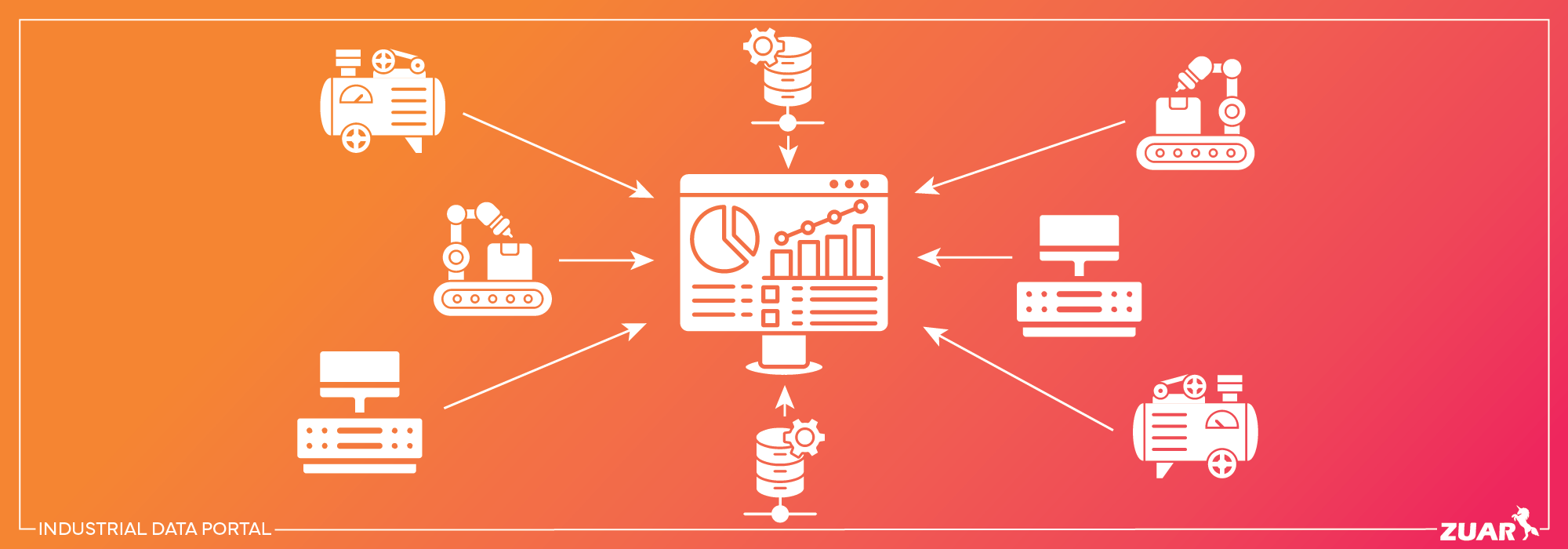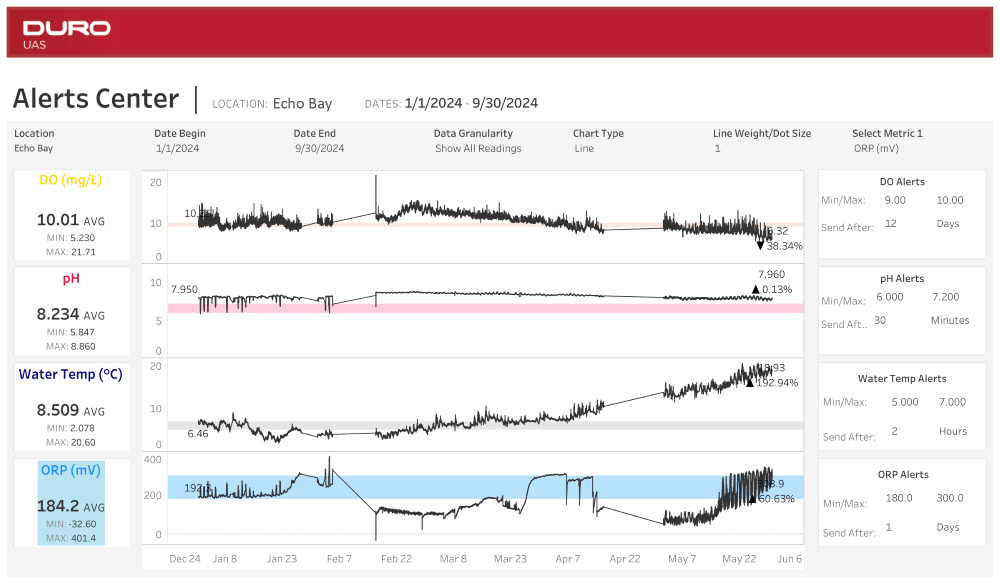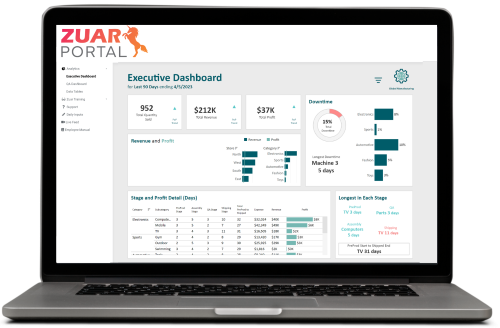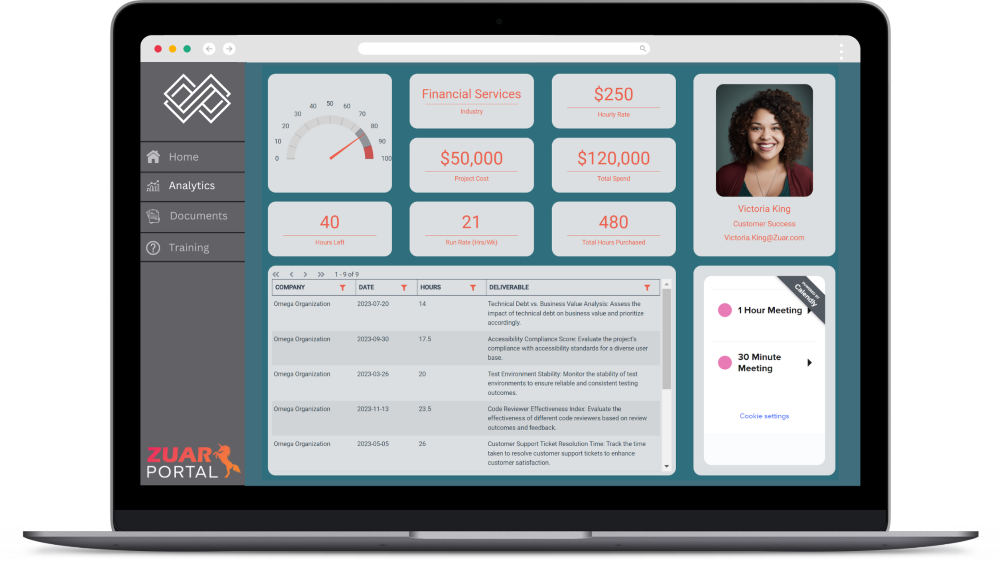What Is an Industrial Data Portal?
What is an industrial data portal, and how can it benefit your business? In this article, we lay out the benefits, challenges, use cases, and more of industrial data portals!

What Are Industrial Data Portals?
Industrial data portals are centralized platforms designed to collect, integrate, and provide access to various types of data generated by industrial operations and equipment.
With the rise of IoT (internet of things) technology, more industrial data is being generated than ever before. The challenge now is how to take this vast influx of data and derive actionable insights. That's what industrial portals aim to do.
These portals serve as a single point of entry for stakeholders, such as engineers, analysts, and decision-makers, to access and analyze data from multiple sources.
With solutions like Zuar Portal, these portals can also be tailored to internal or external stakeholders like customers or partners. This solution gives users all the data analytics they need in an easy-to-use web portal.

These portals handle a wide range of data types, including sensor data, machine data, production data, quality data, maintenance data, etc.
Key components of an industrial data portal typically include:
- Data Ingestion: Mechanisms to collect data from various sources, such as industrial control systems, IoT devices, historians, and enterprise systems.
- Data Integration: Capabilities to normalize, transform, and integrate data from different sources into a unified format for analysis and reporting.
- Data Visualization: Tools and dashboards that enable users to visualize and explore data through interactive charts, graphs, and reports.
- Collaboration and Sharing: Features that enable users to share data, insights, and reports with other stakeholders, fostering collaboration and informed decision-making.
- Security and Access Control: Robust security measures, such as role-based access control, data encryption, and audit trails, to ensure data privacy and compliance with industry regulations.
- White Label Analytics Customization: Capabilities that allow organizations to quickly tailor dashboards, reports, and workflows to meet the specific requirements of their stakeholders.
Learn more about how Zuar can help industrial organizations transform their data processes:


Benefits of Industrial Data Portals
Industrial data portals offer several key benefits that can drive significant value for organizations across various industries:
Improved Data Accessibility
By consolidating data from disparate sources into a centralized repository, industrial data portals enable easy access to critical information for authorized users.
This streamlined access empowers employees, partners, and stakeholders to make informed decisions based on real-time data, fostering collaboration and enhancing productivity.
Enhanced Data Governance
Industrial data portals provide robust data governance capabilities, ensuring data integrity, security, and compliance with industry regulations.
They enable organizations to implement strict access controls, data lineage tracking, and auditing mechanisms, mitigating risks associated with data breaches or misuse.
Increased Operational Efficiency
By providing a single source of truth for industrial data, portals eliminate data silos and redundancies, reducing the time and effort required to locate and reconcile information.
Automated workflows and real-time data updates further optimize operational processes, enabling organizations to respond swiftly to changing conditions and market demands.
Additional Revenue Streams
Organizations looking to share analytics with their customers can leverage industrial portals to monetize their data.
For instance, Duro UAS leverages Zuar Portal to provide a subscription service, allowing customers to pay for access to an industrial portal filled with valuable insights. We touch more on Duro in the case study below.
With these benefits, industrial data portals empower organizations to unlock the full potential of their data assets, driving innovation, enhancing competitiveness, and fostering sustainable growth in the ever-evolving digital landscape.

Challenges in Managing Industrial Data Without a Portal
Managing industrial data without a centralized portal can pose several significant challenges for organizations. One of the primary issues is the creation of data silos, where different departments or systems store and manage data separately, leading to fragmented and disconnected information.
This lack of data integration makes it difficult to gain a comprehensive view of operations, hampering decision-making processes and hindering collaboration across teams.
Another challenge is the lack of visibility and accessibility to critical data. Without a unified platform, locating and retrieving relevant information can be a time-consuming and inefficient process.
Employees may struggle to find the data they need, leading to delays, errors, and missed opportunities for data-driven insights.
Compliance issues are also a concern when managing industrial data without a centralized portal. Regulatory bodies often impose strict requirements for data management, including data security, privacy, and retention policies.
Ensuring compliance across multiple systems and data sources can be a daunting task, increasing the risk of non-compliance and potential legal and financial consequences.

Building vs. Buying an Industrial Data Portal
When it comes to implementing an industrial data portal, companies face a critical decision: build an in-house solution or purchase a customizable solution.
While both approaches have their advantages and disadvantages, we generally recommend purchasing a pre-built solution faster deployment, lower initial cost, and access to ongoing support and updates.

Building an In-House Industrial Data Portal
Pros:
- Customization: Building an in-house solution allows for complete customization to meet the unique requirements of the organization. Every aspect of the portal can be tailored to fit specific processes, workflows, and data structures.
- Intellectual Property (IP) Ownership: By developing the portal internally, the company retains full ownership of the intellectual property, ensuring control over future enhancements and modifications.
Cons:
- Development Costs: Building a robust industrial data portal from scratch can be a significant investment, requiring substantial resources for software development, infrastructure, and ongoing maintenance.
- Time to Market: Developing a custom solution can be time-consuming, delaying the portal's deployment and potentially missing critical business opportunities.
- Ongoing Maintenance: In-house solutions require dedicated teams for maintenance, bug fixes, and feature enhancements, which can be a significant ongoing cost.
- Technical Expertise: Building a complex industrial data portal requires specialized expertise in areas such as data management, user experience design, and scalable architecture, which may not be readily available within the organization.
Purchasing a Customizable Industrial Data Portal Solution
Pros:
- Faster Implementation: Pre-built solutions are typically pre-built and ready for deployment, allowing for a faster time-to-market and quicker realization of benefits.
- Proven Technology: Commercial products are often battle-tested and have been refined based on feedback from multiple customers, ensuring a more stable and mature solution.
- Lower Initial Costs: Purchasing a pre-built solution can be more cost-effective than building a custom solution from scratch, especially for small and medium-sized enterprises.
- Vendor Support: Commercial vendors typically provide dedicated support, maintenance, and regular updates, reducing the burden on internal resources.
Cons:
- Lack of Customization: Pre-built solutions may not perfectly align with the organization's specific requirements, necessitating compromises or workarounds. Solutions like Zuar Portal, however, offer extensive customization options to tailor the platform to unique business needs, bridging the gap between off-the-shelf functionality and specialized demands.
- Recurring Costs: Pre-built solutions often involve recurring licensing fees, maintenance costs, and potential upgrade expenses, which can add up over time.
When deciding between building or buying an industrial data portal, organizations should carefully consider factors such as budget, time constraints, technical expertise, customization requirements, and long-term strategic goals.

Case Study: Duro UAS and the Power of Industrial Data Portals
Duro UAS, an environmental monitoring innovator, faced challenges managing millions of lines of IoT data from various bodies of water.
Partnering with Zuar, they transformed data management by automating extraction, integration, and visualization through Zuar Portal and Runner.
This collaboration enabled real-time data interaction, new revenue-generating dashboards, and scalable, real-time alerts, turning data complexity into growth opportunities.
Watch the success story video:
To read more about the Duro UAS case study, visit this success story page or click here to view all of Zuar's success stories!

Build Your Industrial Portal With Zuar
Zuar Portal is a powerful solution designed to help organizations transform complex data into user-friendly, interactive dashboards that drive business value.
With extensive customization options, organizations can tailor the Portal’s dashboards, reports, and workflows to fit their unique needs. This flexibility ensures that users can focus on the metrics and visuals that matter most to their business.
For companies looking to monetize their data, Zuar Portal also serves as a valuable tool to create marketable products and data-driven services. Secure, scalable, and easy to deploy, Zuar Portal makes it possible to turn raw data into actionable, revenue-generating insights.
Zuar Runner complements this by automating data extraction, transformation, and integration processes, enabling seamless data flow and reducing the manual workload required to maintain data accuracy.
Together, these solutions make up the Zuar Platform, a comprehensive solution that empowers organizations to visualize IoT data, monitor key performance indicators, and share critical analytics with precision and impact.
Click here to set up some time with one of our experts to learn more about the Zuar Platform, or if you'd like to start a free trial of Zuar Portal, click the button below!



